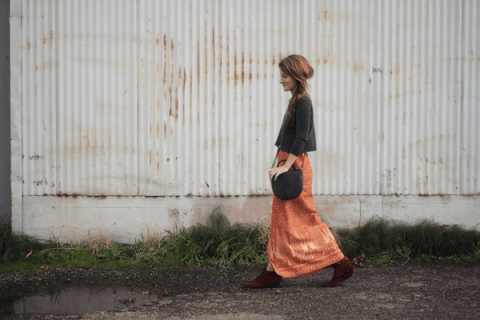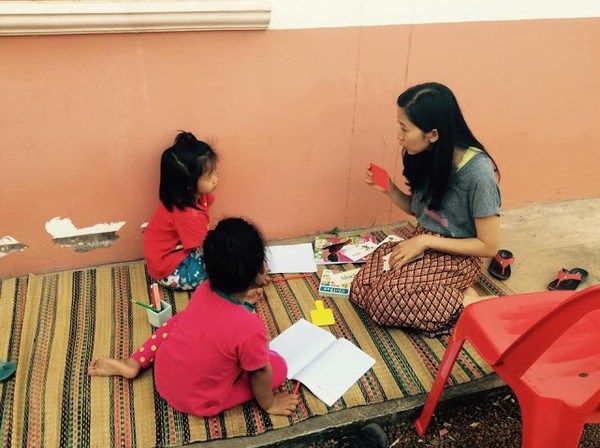Ethical Fashion: Why We Should Give A Damn
Todays post comes from my good friend Katie Metzger, co-founder and creative director of Same Thread.
Ethical Fashion: Why We Should Give A Damn
What we wear tells a story of who we are and what we value. It is a powerful expression of self-identity that is often one of the first things that others take notice of. We communicate a story without words through these mundane, everyday choices.
Look at the clothes you are wearing right now….What story do they tell about you? We often strive to construct an image through clothing to expresses internal qualities such as creativity, free spiritedness or minimalism. But how often do we use clothing to express our values of sustainability, social justice or empowerment?
In our increasing fast-moving world, clothing construction and fashion have become less of an art of self-expression and more of a disposable commodity. On our backs one day, in the trash the next. The explosion of “fast fashion” in recent decades has proved to be disastrous both environmentally and economically for garment workers and their communities worldwide. Would you believe that 80-90% of what you are wearing was made in inhumane, unsustainable conditions? The hard truth this is most often the case. Sweatshops are not a thing of the past and expensive or high-end clothing is not exempt to this problem.
This is hard to swallow, and as someone who loves fashion and also strives to be an advocate for social justice, it can seem too overwhelming to even think about. However, information and acknowledgement is where change begins. So why should you give a damn about where your clothing comes from and what can you, practically, do?
When discussing the issue of ethicality in the clothing industry, one may have images of sweatshops and child laborers in developing nations toiling all day in inhumane conditions. Although this image may seem extreme, it is a very real aspect of our current garment and fashion industry practices worldwide. Sweatshops from Bangladesh to Cambodia to Mexico routinely pay their workers less than $1.20 per day for their work. This is not a living wage, even in the most poverty-stricken communities. The chronic underpayment of garment industry workers creates a cycle of poverty in already struggling communities, in turn contributing to other social issues resulting from poverty such as lack of access to education, health problems, and sex work. Not to mention the environmental toll that fast fashion takes on the communities in which they are made. Sweatshops are not only present in developing nations but are also a growing problem in the United States.
According to the U.S. Department of Labor, in recent years roughly 11,000 U.S. based factories were cited as violating workers’ rights and not paying laborers a minimum wage. This shows the problem of human rights violations in textile and garment factories is not only an international problem but a domestic problem as well. Additionally, many companies touted as being ethically made have had numerous sweatshop scandals. When it comes to clothing ethicality we must learn to be active, not passive, consumers of information.
Recently a study was conducted by the American Sociological Association regarding the marketability of fair trade products; this study found that an overwhelming majority of consumers would pay $1-$5 more for items they know are made in an ethical way. Although large strides towards ethical production have been made in the coffee, chocolate and food industry, the clothing industry remains hugely underserved.
You may say “Well, now I’m thoroughly depressed… What can I actually do without having to trade in all my favorite items for hemp, organic, recycled burlap sack crap?” All change starts with small steps. Here are some suggestions for leaning into change when it comes to fashion:
- Realize that someone is paying the price for your clothing…is it you or the garment worker?Jeans should cost more than $9.99. When you come across clothing that is extremely cheap ask yourself, “what kind of production practices lend itself to producing a $3 tank top”? The answer is usually pretty obvious.
- Inform yourself about your favorite brands. It is well-known that companies such as Forever 21, H&M, Victoria’s Secret, and Wal-Mart have unethical supply chains. However, information and transparency is severely lacking for many brands, especially those that are higher end. Do some digging online and if nothing is available, request information. Here is a thorough list to get you started on what companies to avoid and which to buy.
- If you are unsure, shop local and second-hand. Finding local markets and boutiques that sell items from local designers supports your community’s economy and makes it easier to engage in conversation and get information. Also, second-hand and vintage shopping can be a cost-effective and fun way to go! Most of my favorite pieces in my wardrobe were found at great vintage stores. I love that shopping locally and second-hand gives me a unique wardrobe and personal style.
- Start exploring and support fair trade fashion companies. As I stated earlier, finding fair trade clothing that is actually fashionable can be a struggle. Many fair trade clothing companies are either insanely expensive or produce clothing you wouldn’t want to wear. However, lately there has been a huge surge of new fashionable clothing companies that are competitively priced. Here is a list of some of my current fair trade favorites: Della LA, Reformation, People Tree, Fortress of Inca.
Due to the lack of choice in the ethical clothing market, I was inspired to create and launch an ethically made, eco-friendly women’s clothing company that works to economically empower women. Same Thread works with women in NE Thailand providing job skills training and stable employment in an effort to combat the prevalence of sex work through prevention. For more information visit us at Samethread.com.
Informing ourselves and leaning into change is the first step to breaking our collective addiction to fast fashion. Join me in working to bring ethical progress to the fashion industry.
Katie is a native Pacific Northwesterner with a passion for social justice and bringing fair trade businesses practices into the mainstream. In 2014 she completed her MA in International Development, where she focused on social enterprise and its capacity to economically empower women. On a typical Saturday she can be found cooking, sewing, drawing, listening to records, vintage shopping, sipping whiskey and playing with her puppies at her home in Seattle.



